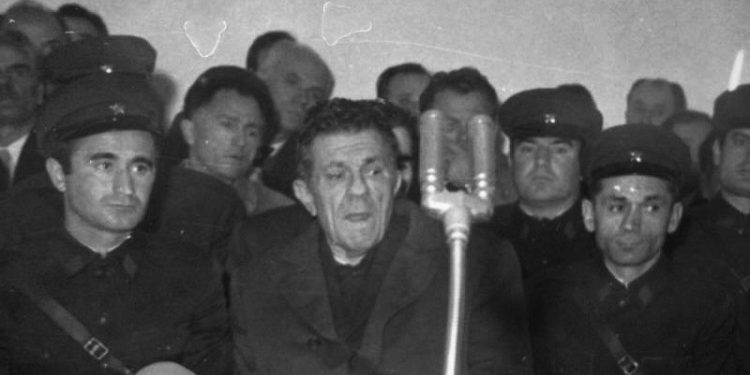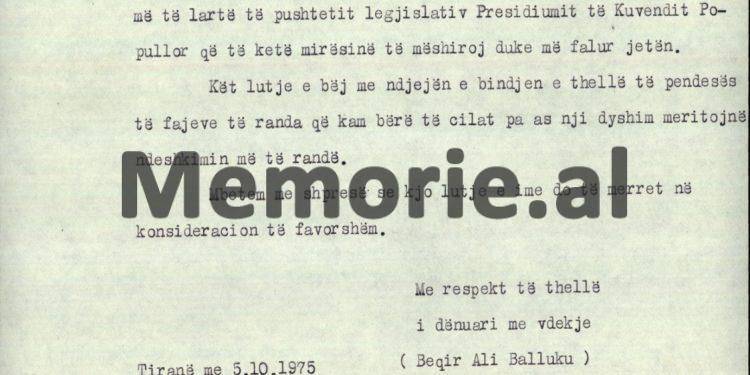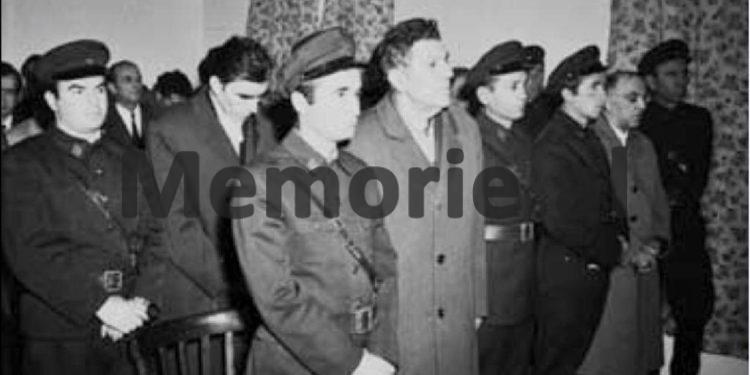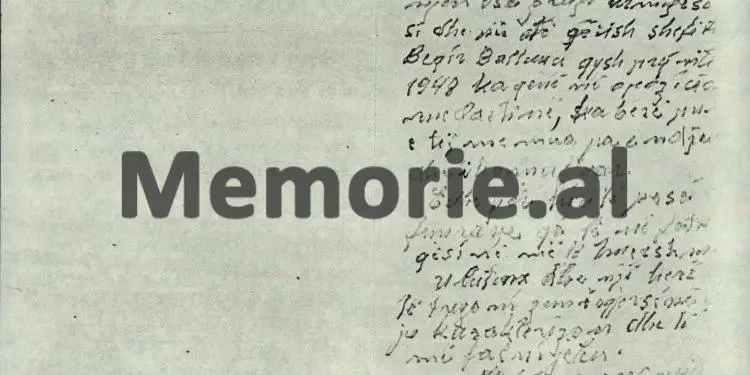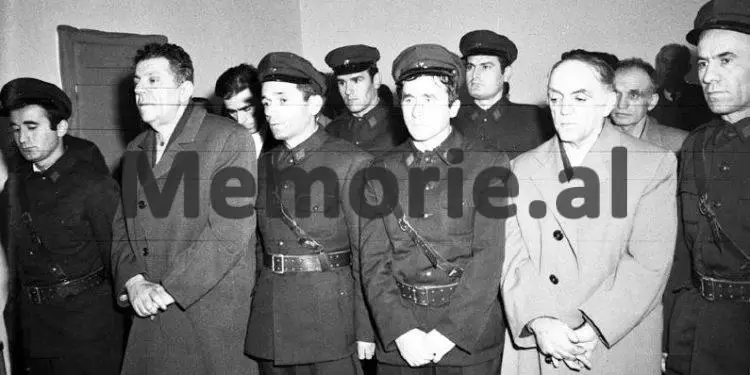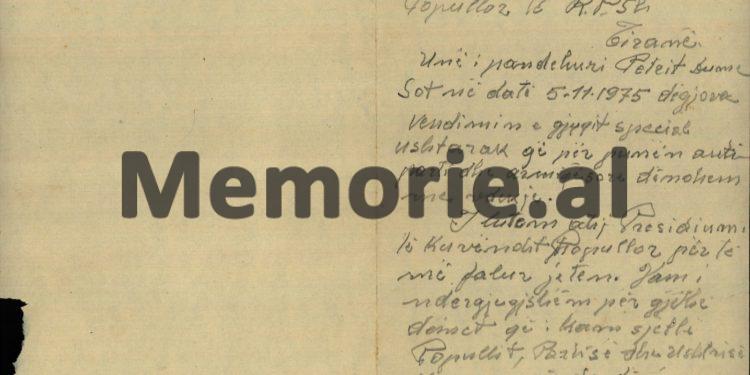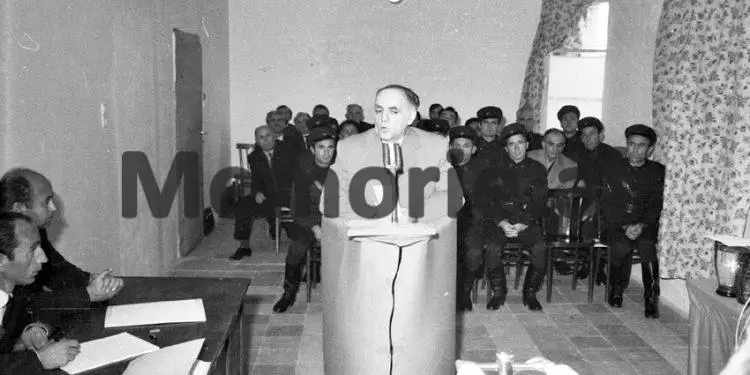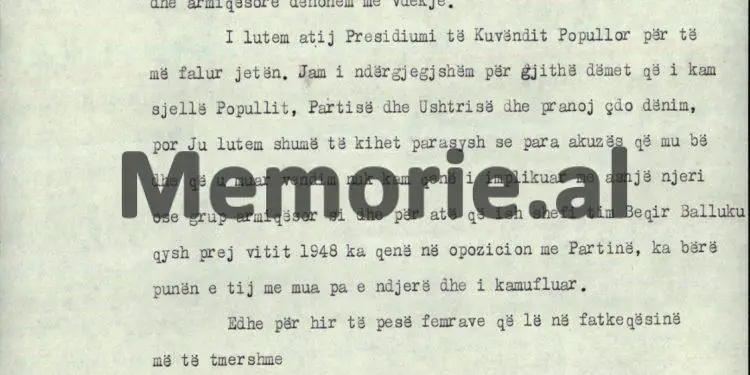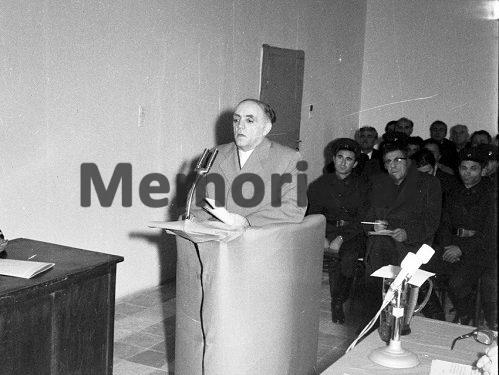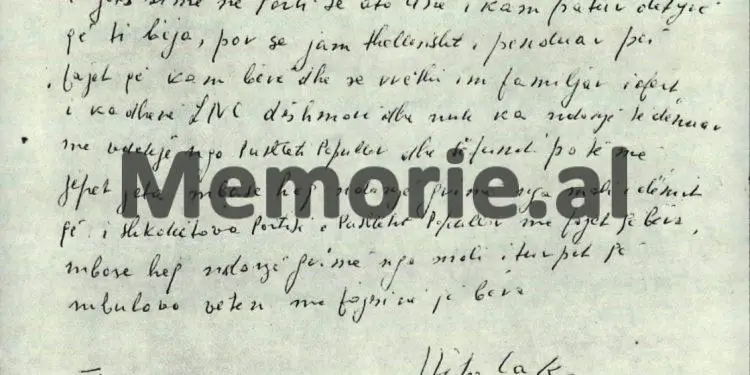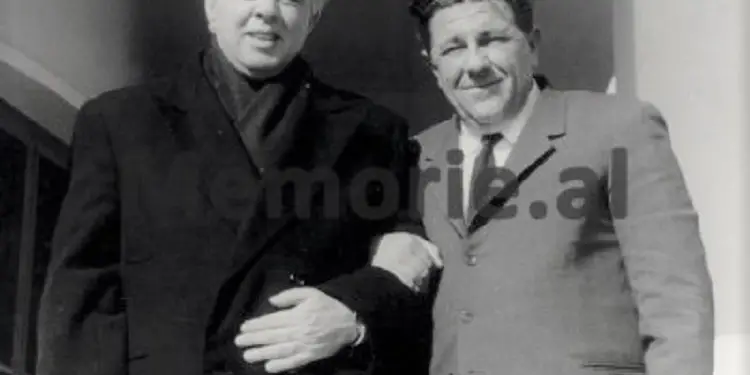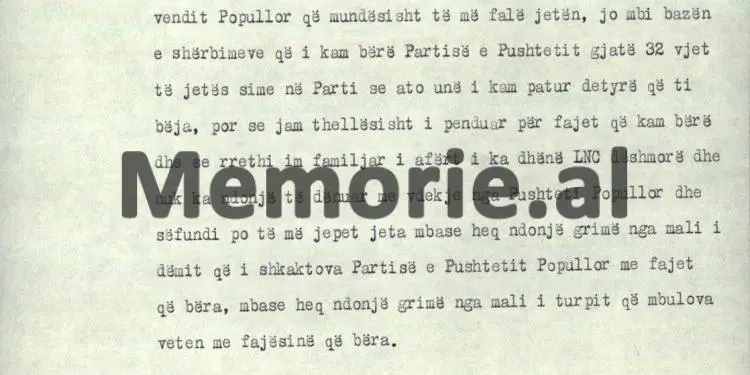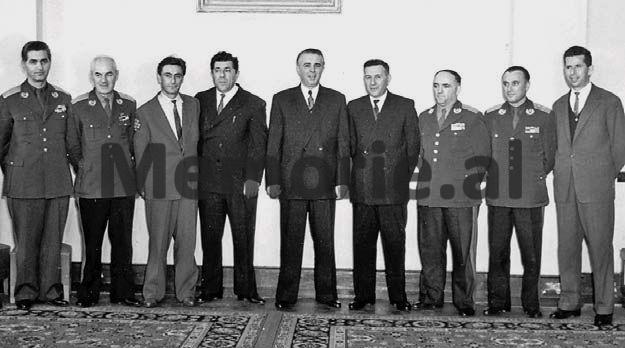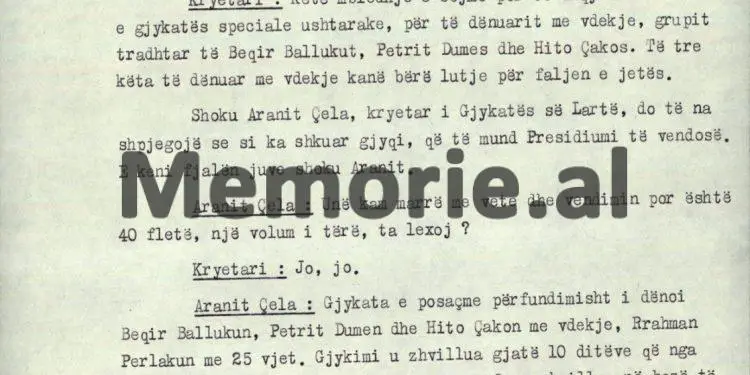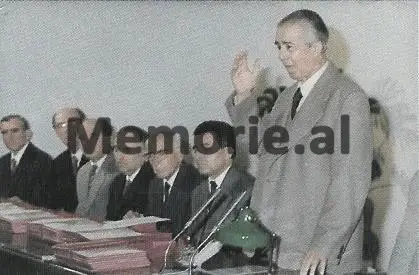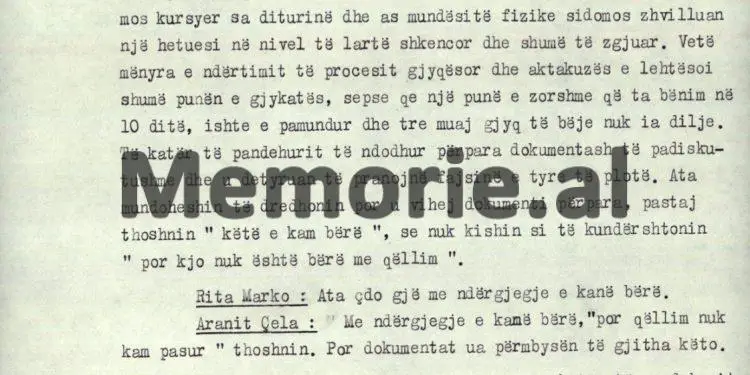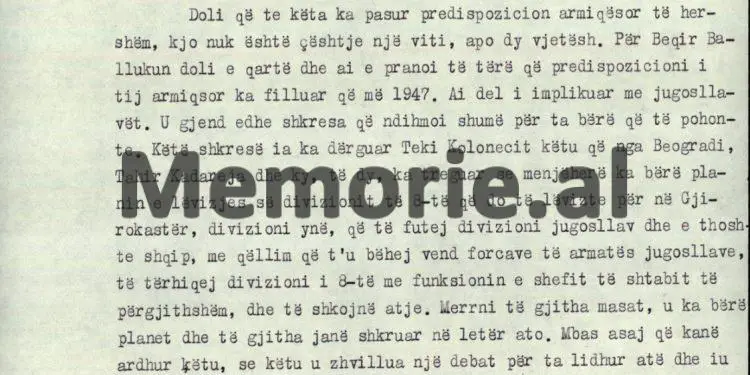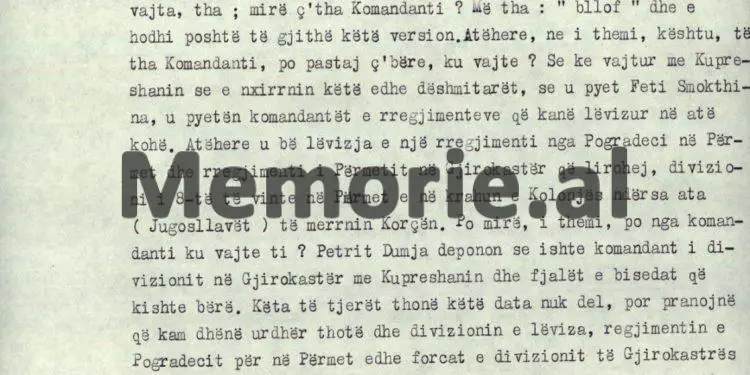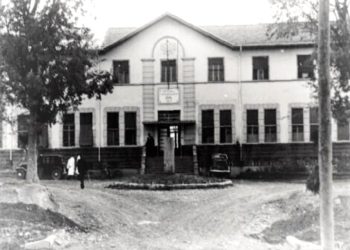By Dashnor Kaloçi
The second part
Memorie.al/ On November 5, 1975, exactly 49 years ago, the president of the Supreme Court of the People’s Republic of Albania, Arani Çela, by means of a letter marked “Top Secret”, addressed to the Presidium of the People’s Assembly, attached a copy of the decision of that court, with a summary of the indictment of the death sentence, by firing squad, of the three former generals, the highest leaders of the Ministry of Defense, Minister Beqir Ali Balluku, the Chief of Staff of the General of the Army, Petri Taulla Dume and the Director of the Political Directorate, Hito Shaqo Çako, as well as the 25-year prison sentence of Rrahman Parllak, former Deputy/Chief of the General Staff of the Army, in the Ministry of People’s Defense.
The trial against them, held from October 25 to November 5 of that year, in an improvised hall in the premises of Ward 313 of Tirana, (otherwise known as the “Old Prison” or “Kaushi”), where they also the investigative process, remained isolated and under strict security measures, since the period of their arrest, on December 6, 1974. The arrest of Balluk, Duma, Cako and Parllak, came after a period of nearly six months, collection of assets and plenums, developed with the highest cadres of the Ministry of People’s Defense, the secretariat of the Central Committee of the ALP and the Political Bureau, where Enver Hoxha personally assisted and directed most of them.
The attack on Beqir Balluk, who for years held the post of Minister of People’s Defense and first deputy prime minister in the government headed by Mehmet Shehu, as well as a member of the Political Bureau of the ALP Central Committee, began in June-July of in 1974, with the extended meeting of the Army Active, which was held in the former “Bird House” of the city of Durrës. That meeting was chaired by Mehmet Shehu and Hysni Kapo, where Balluku, for the first time, since 1945, was not in a meeting presidium, but in the hall, where he was forced to answer dozens of questions, asked by subordinates his. Everything that was happening there in that hall and that would continue until the day of the arrest, was pre-prepared based on a well-crafted scenario by the main leaders of the senior leadership of the ALP, such as Mehmet Shehun and Hysni Kapon , personally conceived and directed by Enver Hoxha.
After that activity with the highest cadres of the Army, Balluku was also analyzed in the meetings of the Political Bureau of the Central Committee of the ALP, where Enver Hoxha was the first to direct the attacks against him, accusing him of; “the head of the coup group in the Army” and “the biggest traitor that Albania had until that time”. After those meetings of the Political Bureau, Balluku was also analyzed in the Fifth Plenum of the Central Committee of the ALP, which was held on July 25, 1974, where he was attacked by the majority of the members of the plenum.
At the end of that meeting, Balluku was expelled and dismissed from all party and state functions, but, unlike many of the former functionaries and senior figures of the communist senior leadership, (who had been hit and convicted years before, who were arrested and handcuffed as soon as they left the assembly hall), he was released to go home! Where after ten days, together with part of his family, he would be interned in the town of Roskovec, in the district of Fier, where he was arrested on December 6, 1974.
Now all this and more for Beqir Balluk, the former Minister of People’s Defense and the first deputy prime minister of the government headed by Mehmet Shehu, who until 1974, was considered one of the closest collaborators and most loyal people of Enver Hoxha, are very popular, since after the 90s, dozens and dozens of testimonies and archival documents were also published, which shed light on his life and career, from the period when he was the main leader of the Guerrilla Units of of Tirana and commander of the Second Assault Brigade of the National Liberation Army, as well as the entire period in charge of the Ministry of People’s Defense, until July 1974.
What has remained an almost unsolved and unknown mystery, which continues to be discussed even today after almost five decades, are the main reasons and causes that forced Enver Hoxha to hit Balluk and the two main leaders of the Ministry of Defense, Petri Dumen and Hito Chako, sentencing them to death, as; “The leaders of the coup group in the Army”! Along with this mystery, which will probably never be solved, the archival documents with the minutes of the meetings of the Presidium of the People’s Assembly of the People’s Republic of Albania, where the requests and prayers for the pardon of life, were discussed, are almost unknown the side of the three former leaders of the Ministry of Defense, Balluku, Dume and Çako.
Based on this, Memorie.al is publishing in several numbers these archival documents, where there are discussions of all the members of the Presidium of the People’s Assembly, starting from its head, Haxhi Lleshi, (President), Rita Marko (Vice President), Telo Mezini (Secretary), as well as members; Jovan Bardhi, Muharrem Sefa, Naunka Bozo, Nuredin Hoxha, Spiro Moisiu and Zinja Franja.
Continues from the previous issue
THE REQUESTS OF BEQIR BALLUK, PETRI DUMES AND HITO ÇAKOS, SENT TO THE PRESIDIUM OF THE POPULAR ASSEMBLY, WITH PRAYERS TO SPARE THEIR LIVES
Prayer
Presidium of the People’s Assembly
Tirana
The undersigned, Beqir Ali Balluku, sentenced to death by the Special Military Court, on 5.11.1975, I am begging the highest instance of the legislative power, the Presidium of the People’s Assembly, to have mercy on me, sparing my life. I make this prayer with the feeling and deep conviction of repentance for the grave sins I have committed, which without a doubt deserve the most severe punishment. I remain hopeful that this prayer of mine will be taken into favorable consideration.
Tirana on 5.11.1975 with deep respect
The one sentenced to death
(Beqir Ali Balluku)
Prayer
Presidium of the People’s Assembly of the R.P.SH.
Tirana
I, the defendant Petrit Dume, today on November 5, 1975 heard the decision of the Special Military Court, that for anti-party and hostile work, I am sentenced to death. I pray to that Presidium of the People’s Assembly, to spare my life. I am aware of all the damage I have brought to the People, the Party, and the Army, and I accept any punishment, but please bear in mind that before the accusation made against me, and the decision was made, I was not involved with no person, or hostile group, as well as for what my former boss, Beqir Balluku, since 1948, has been in the opposition with the Party, has done his work with me, without feeling and camouflaged. Even for the sake of five women, that leaves in the most terrible disaster. I am asking you once again to show the generosity that characterizes you and to spare my life.
With the greatest trust and respect
Peter Dume
Tirana on 5.11.1975
Prayer
Presidium of the People’s Assembly
Tirana
I also find the court’s decision on my death sentence based on my guilt. I am begging the Presidium of the People’s Assembly, to spare my life if possible, not on the basis of the services I have rendered to the Party of Power, during the 32 years of my life in the Party, which I had the duty to do, but that I am deeply sorry for the sins I have committed, and that my close family circle has given martyrs to the National-Liberation War, and there is no one sentenced to death by the People’s Power, and finally if my life is spared, maybe I will remove a bit from the mountain of damage I caused to the People’s Power Party, with the mistakes I made. Maybe it removes a bit, from the mountain of shame, that I covered myself with the guilt that I did.
Tirana on 5.11.1975
With respect
Hit Chako
ARCHIVE DOCUMENT WITH THE MINUTES OF THE MEETING OF THE PRESIDIUM OF THE POPULAR ASSEMBLY, WHERE THE DECISIONS OF THE SPECIAL MILITARY COURT WERE DISCUSSED ON THE DEATH SENTENCES OF BEQIR BALLUKU, PETRI DUMES AND HITO ÇAKOS
RECORDS
Held at the extraordinary meeting of the Presidium of the People’s Assembly, dated 5.11.1975, Wednesday:
Comrades participate in the meeting: Haxhi Lleshi (Chairman), Rita Marko (Vice-Chairman), Telo Mezini (Secretary), Jovan Bardhi, Muharrem Sefa, Naunka Bozo, Nuredin Hoxha, Spiro Moisiu, Zinja Franja, (Members).
CHAIRMAN HAXHI LLESHI: We are holding this meeting to review the decisions of the Special Military Court, for those sentenced to death, the traitorous group of Beqir Balluku, Petri Dumes, and Hito Çakos. All three of these condemned to death have prayed for the pardon of life.
Comrade Aranit Çela, president of the Supreme Court, will explain to us how the trial went, which the Presidium can decide. You are talking about you, friend Arani.
ARANIT ÇELA: I took the decision with me, but its 40 pages, a whole volume, should I read it?!
CHAIRPERSON: No, no.
ARANIT ÇELA: The Special Court finally sentenced Beqir Balluku, Petrit Duma, and Hito Çako to death, and Rrahman Përllaku to 25 years. The trial took place over 10 days, from October 25, until today, at 9 o’clock. It took place based on all the requirements of the law, ensuring the defendants’ rights to the maximum. All the defendants in their last speech stated that they were given all the opportunities to express themselves and defend themselves. The court had to review a large amount of written materials. In total, a material of 18 volumes, over 3000 written pages, with documents and minutes of various types, two boxes full, was examined.
The special characteristic of this judicial process was the reliability in the first place, not in the statements of the defendants, but mainly in the documents. What does this mean? There, the work was done with documents. This is one of the trials, one of the rare cases that in such matters, such as treason, takes place only mainly on the basis of documents, of course the others also had their influence. All these accusations were based on documents, and this forced the defendants, both in the investigator and in the court, to admit, they had nowhere to move, no matter how hard they tried to twist, we immediately took out the document. It should be noted here that the investigation bodies, related to this process, have developed a wonderful work.
They, sparing neither knowledge, nor physical opportunity, especially developed an investigator at a high scientific level and very smart. The very way of constructing the judicial process and the indictment greatly facilitated the work of the court, because it was a difficult job to do in 10 days, it was impossible to do a trial for three months, you would not succeed. All four defendants, faced with indisputable documents, were forced to admit their full guilt. They tried to deceive, but the document was put in front of you and then they said; “I have done this”, because they had no way to object; “but this was not done on purpose”.
RITA MARKO: They did everything conscientiously.
ARANIT ÇELA: They did it with conscience, “but I had no intention”, they said. But the documents overturned all that.
In the last word that he gave them, the four defendants, fully admitting that they have committed very serious crimes, for which they say, any type of punishment and that capital is justified, left the case finally, in the hands of court, in the hands of party justice. The accusation against the defendants was mainly focused on five main areas:
- Regarding the sabotage of the leadership role of the Party, this was one of the main accusations that occupied most of the space. There was the most material and violations. D. m. ie, the greatest hostile work.
- Sabotage in the field of defense of the country, i.e., in the field of military art, military preparation, and fortification of the country.
- Sabotage in the field of legislation and economy, in the state organization.
- Sabotage on the ideological front.
- Embezzlement, theft, embezzlement, and the shenanigans they have done.
What happened in relation to the personality of the defendants?!
It turned out that they had an early hostile predisposition, and this is not for a year or two. For Beqir Balluku, it is clear and he himself admitted that his hostile activity began in 1947. He is implicated with the Yugoslavs. The letter was also found which helped a lot to make him affirm. Tahir Kadareja sent this letter to Teki Kolaneci here, from Belgrade, and he, both of them, showed that he immediately made the plan for the movement of the 8th Division, which would move to Gjirokastër, our Division, which to enter the Yugoslav Division, and he said it in Albanian, in order to make room for the forces of the Yugoslav Army, to withdraw the 8th Division, with the function of the Chief of the General Staff, and go there.
Take all the measures, he has made the plans, and so they are all written on paper. After they came here, that here a debate was held, to tie it up, and it was said: “Well, why did you do that”? “Yes, he said, I believed that Tito called me.” Beqir Balluku, had a personal meeting with Tito, without calling Kristo Themelko, only him and the chief of the General Staff of Yugoslavia, and was put forward. This one says that they put me in front of an unknown situation, took out a map, and told me that the Greeks have come to the border, Albania will be attacked. I told him to ask the Albanian command, Tito took the phone and said quickly notify Koci Xoxen, that the situation is like this, and he should be notified, and then in turn, the second Commander, i.e., “also” the Commander. “In these conditions I obeyed”, says Beqir Balluku.
“Well, you obeyed there in Yugoslavia,” we say, “but then you came to Albania”?! The first time he lied to us. He told us that I came the next day, urgently to Albania, while it appears from the documents that he did not come, that Belgrade is 1-2 hours away, that’s one day, but there was a difference of five days. Finally he admitted that he had lied and said that he had come here after four days. “When I came – he said, – after four days, Kristo Themelko held me, and I showed him and talked to him. He (K. Themelko) held me and then I went there”.
Well, we told him, come to the Commander-in-Chief, he said, well, what the Commander said?! He called me “bluff” and dismissed this whole version. Then we tell him, that’s what the commander told you, but then what did you do, where did you go?! That you went with Krupeshan, that the witnesses brought this out, that when Feti Smokthina was asked, the commanders of the regiments that moved at that time were asked. Then the movement of a regiment was made, from Pogradec to Përmet, and the regiment of Përmet in Gjirokastër, which was released, the 8th Division, was to come to Përmet and to the side of Kolonje, while they (Yugoslavs) took Korça.
Well, we say, but from the commander, where did you come from?! Petrit Dume, testifies that he was the commander of the Division in Gjirokastër with Krupeshan, and the words and conversations they had. These others say that on these dates, it does not come out, but they admit that I gave the order, and I moved the division, the Pogradec regiment to Përmet, and I moved the forces of the Gjirokastra Division, part of the forces, that I did not manage to I moved them all.
RITA MARKO: That is, on the basis of Tito’s order.
PILO PERISTERI: And he says that we did it without intentions!
PRESIDENT: “There were no goals”, but only that they wanted Albania to be conquered by Tito.
ARANIT ÇELA: He did not accept Beqir Balluku, who was prepared, before he came to Comrade Enver, when he came, when the Yugoslavs came to Comrade Enver, then those who asked for the entry of the forces, they had prepared him, he said, but he denied this, that I did not tell them, that I would defend their thesis, when we get there. When we went there, he said, Comrade Enver did not accept the discussion, as soon as the word was opened, he took us all out. When Comrade Enver spoke, I supported him. We told him, if you supported Comrade Enver, whatever you do, even if he supported him, what did Comrade Enver do, he took out all the Yugoslavs at once and said that this is all a bluff. There are no forces entering here.
In a word that comes out here, but it doesn’t end here, that he was defeated then, he admitted that I was under the influence of Yugoslav politics, I was for the unification of the armies, I gave the floor to Tito there, and in Belgrade, the attitude we have held, was not fair. After that, he tells about the connections he had with Tuk Jakova. Kam was saying against the punishment of Tuk Jakova, he admitted that he had had conversations with him, about the things he was in the opposition with. He told concrete cases, of conversations with Tuk Jakova, where they went last night, etc., which he told in detail. With Liri Belishova, he said, I had a close friendship. We entered the political field and I agreed, with the views she expressed at that time, about the opening of Albanian politics, i.e., the passing of Khrushchev. Khrushchev wanted an open policy.
RITA MARKO: Yes, with open doors, at the 20th Congress.
ARANIT ÇELA: Yes, said Beqir Balluku, I have supported this policy, but I have not shown any activity, that is, that I have acted. I only supported them and talked to them.
PRESIDENT: And if he didn’t tell, when he agreed, i.e., he was afraid, how can we trust him.
ARANIT ÇELA: That he didn’t act, that doesn’t matter at all. I had Soviet ideas, he said, on some key issues of the party’s general policy. I, he emphasized, did not believe that the Soviet Union had turned into a capitalist country. I have always thought that our party says these things for political reasons, and that in the Soviet Union, socialism still exists, these are just conflicts between parties. I was talking about open politics, about relations with the West, I was talking about relations with the Soviet Union, and I said this to Dashnor Mamaqi, and……….!
CHAIRPERSON: He told his friends and partners.
ARANIT ÇELA: I told them, he said, that we should establish relations with the Soviet Union. Diplomatic, economic relations, and only exchange of experience, in the economic field, not political (this limitation). This entire picture was given by this one. There were also some views regarding the opening of tourism doors, the independent cooperation of enterprises, with foreigners, such as the “Traktori” plant, to have a direct connection with Italy, etc. That is, he was for “self-administration”, as in Yugoslavia, this is known. He said, I introduced these ideas to the army in several cases.
And there are the facts that are proven there, in the creation of enterprises, in the decentralization of powers, etc. His authority, he has given down the commands. These are documented, all in violation of state laws. I have done these things, but only in the army. These have generally been my views. From the investigative and judicial process of Beqir Balluk, it appears that it is not only about hostile activity within the army. Here is a whole camouflaged line. It’s an issue that doesn’t just come up in recent years, with the Open Letter; it’s at least since 1947, as he says, onward. Memorie.al




